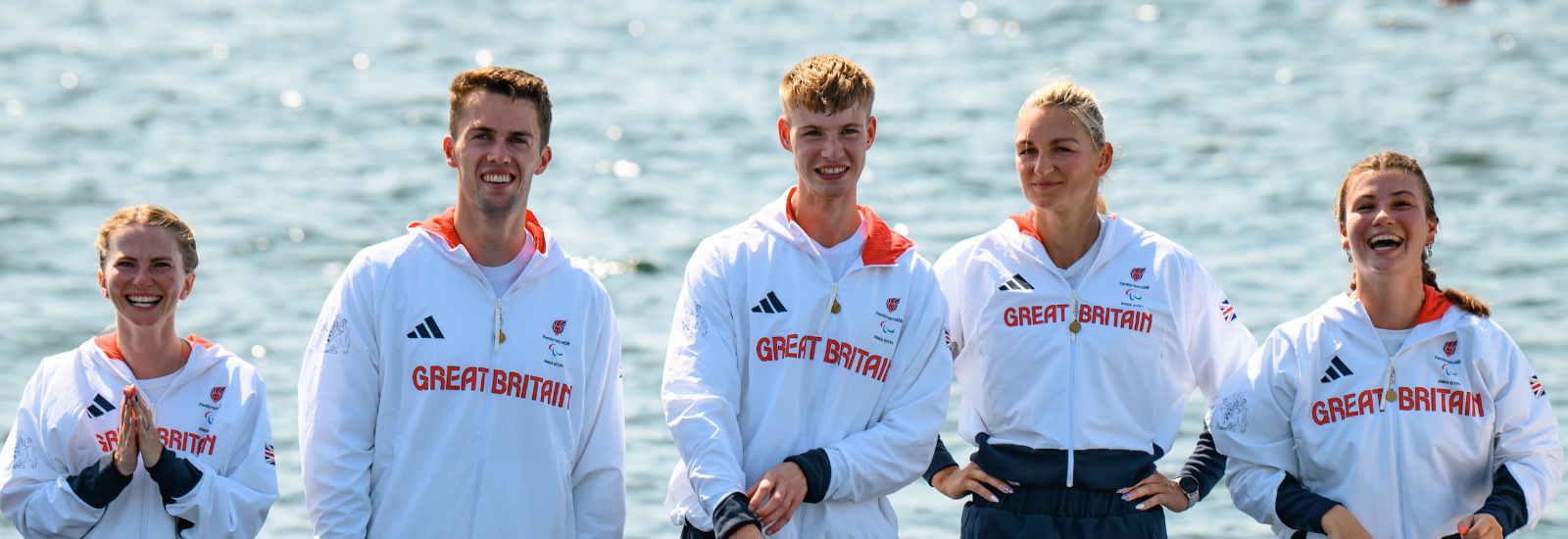From balancing boats to books – Paralympic gold medallist and Reading student, Ed Fuller, shares how he juggles elite rowing with studying, with the support of Reading’s alumni community.
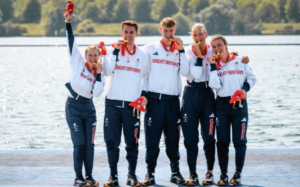 At just 21 years old, Ed has already charted an extraordinary path in both his sporting and academic life. Diagnosed with haemophilia at a young age, the second-year student turned a potential limitation into a launchpad – carving out a unique space for himself in the competitive world of paralympic rowing.
At just 21 years old, Ed has already charted an extraordinary path in both his sporting and academic life. Diagnosed with haemophilia at a young age, the second-year student turned a potential limitation into a launchpad – carving out a unique space for himself in the competitive world of paralympic rowing.
Ed shares with CONNECTED how the Sporting Excellence Scholarship – made possible by generous donors, many of whom are University of Reading alumni – has made a huge difference. He credits this support with helping him row to gold at the 2024 Paris Paralympic Games whilst balancing elite rowing with his geography studies.
Watch the video below to hear Ed’s story.
All the right boxes
Ed’s journey into rowing began during a simple PE lesson. Ed explained: “I got into rowing mainly because of haemophilia – this is a condition which affects my blood’s ability to clot. So when I cut myself, I will bleed for much longer than your average person. It also causes joint pain and limited mobility.
“The condition meant I couldn’t do the high impact sports, such as rugby and football, that are often taught at schools.”
It was by chance that at 11 years old Ed found himself on an indoor rowing machine. By the time he joined Exeter Rowing Club in Year 7 his love for rowing had snowballed.
“Rowing isn’t weight-bearing but is still incredibly aerobic. It works so many muscles,” he explained. “I stayed with Exeter Rowing Club from the age of 11-18 and did all of the junior competitions there, including the Junior British National Titles and trying out for GB Juniors.”
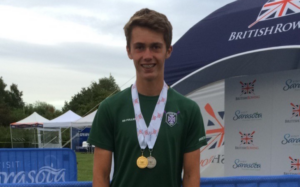 It was the satisfaction of seeing his hard work pay off at the 2017 Junior British Championships that had Ed hooked. He laughed: “We worked really hard and really wanted to win. Although, now when I look back the training probably wasn’t actually that hard, but it felt it to 14-year-old me.
It was the satisfaction of seeing his hard work pay off at the 2017 Junior British Championships that had Ed hooked. He laughed: “We worked really hard and really wanted to win. Although, now when I look back the training probably wasn’t actually that hard, but it felt it to 14-year-old me.
“After winning the Championships, I knew rowing was something I wanted to pursue seriously. I had started to see that, as with most sports, you really do get out what you put in.”
After finishing secondary school, Ed took a gap year to focus on rowing and successfully became part of the Paralympic rowing team – competing in his debut year in 2022. However, impressed by its strong programme and proximity to the national rowing training centre in Caversham, Ed also decided to pursue geography at the University of Reading .
“Reading was the perfect place for me and it ticked all the right boxes,” he explained. Ed undertook his first year as a part-time student – enabling him to focus on the Paris 2024 Paralympics where he won gold in the PR3 Mixed Coxed Four event, alongside teammates Frankie Allen, Josh O’Brien, Giedre Rakauskaite and Erin Kennedy.
Grabbing gold
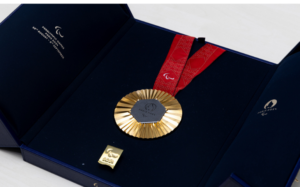 Competing at the Paralympics was a career-defining moment for Ed, with 12,000 people watching his final race.
Competing at the Paralympics was a career-defining moment for Ed, with 12,000 people watching his final race.
He said: “We had the American team right on us until the very last second and the crowd’s noise drowning out our cox. I’ve never experienced that sort of noise at a rowing event before, it was incredible.
“It was especially nice as there were members of the University of Reading Rowing Club in the crowd, so looking up and seeing them cheering us on was really special.”
However, the trip wasn’t without its challenges, including managing his daily medication and adapting to the physical demands of the event. Ed explained: “The village is pretty big, so there was a lot of walking or standing for a long time – which for myself and other Paralympic athletes is a challenge.
“There was also a moment of concern when some of my medication, which is part liquid, had solidified in the refrigerator overnight and I had to try and defrost it pretty quickly. I can laugh about it now, but it was incredibly stressful at the time.”
Despite some challenges along the way, Ed embraced the entire experience.
He said: “Once it was all over we visited all the tourist spots in Paris and had some great opportunities. We visited the British Embassy and the TV show, The Last Leg, did a Channel 4 round-up of the Paralympics which covered our win. Myself and the crew were on the stage swinging the presenter, Adam Hills, by his arms and legs in one of their challenges – it was very surreal but cool to be on a live TV show.
“I’d always wanted to go to the Stade de France, a large stadium in Paris, so I also went there to watch the athletics and the wheelchair tennis, in a packed-out stadium.”
Sport, scholarships, and the future
Ed has been fortunate to receive the Sporting Excellence Scholarship twice now, to alleviate the financial strain of training, race fees, and specialised equipment. And for Ed, the importance of this spans far beyond medals and titles.
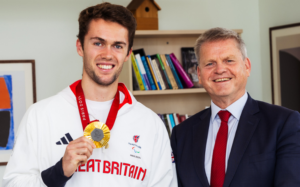 He explained: “The scholarship helps open the door for so many people. The equipment required for sports, for example, is very specialist and expensive – so it can be a real limiting factor for people wanting to excel in their chosen sport.
He explained: “The scholarship helps open the door for so many people. The equipment required for sports, for example, is very specialist and expensive – so it can be a real limiting factor for people wanting to excel in their chosen sport.
“To be able to make all sports as accessible for as many people as possible is so important. It’s not just about winning medals, it’s about enabling people to discover their potential and passion.
To be able to help people chase their dreams is an amazing thing. Thank you to everyone who has helped me to chase my dream.
He said: “I don’t know what I would do without rowing. The friends you form and that sense of camaraderie, alongside the structure and consistent movement, is so beneficial to your physical and mental health.”
With a packed calendar there’s no chance of Ed slowing down anytime soon. He said: “This year the focus is on the Henley Royal Regatta and the World Championships in Shanghai – so it’ll be a packed year for training.
“The Regatta will be exciting – we have a strong group and it’s an event where all the people who once rowed at Reading Rowing Club come to show their support.
It’s great to hear the alumni cheering from the bank.”
Ed’s advice to aspiring athletes is simple – to just start: “The hardest part is starting. Once you find a sport you love, the benefits – mental, physical and social – are unparalleled. Don’t underestimate what you can achieve.”
Ed credits the University’s supportive environment, including a flexible coaching team and the camaraderie of his peers, for helping him thrive. He said: “Being part of a group of top-end athletes at the University has been fantastic. It’s great to share my experiences and learn from others too.
“I hope I’ll still be rowing well into my 80s.”

